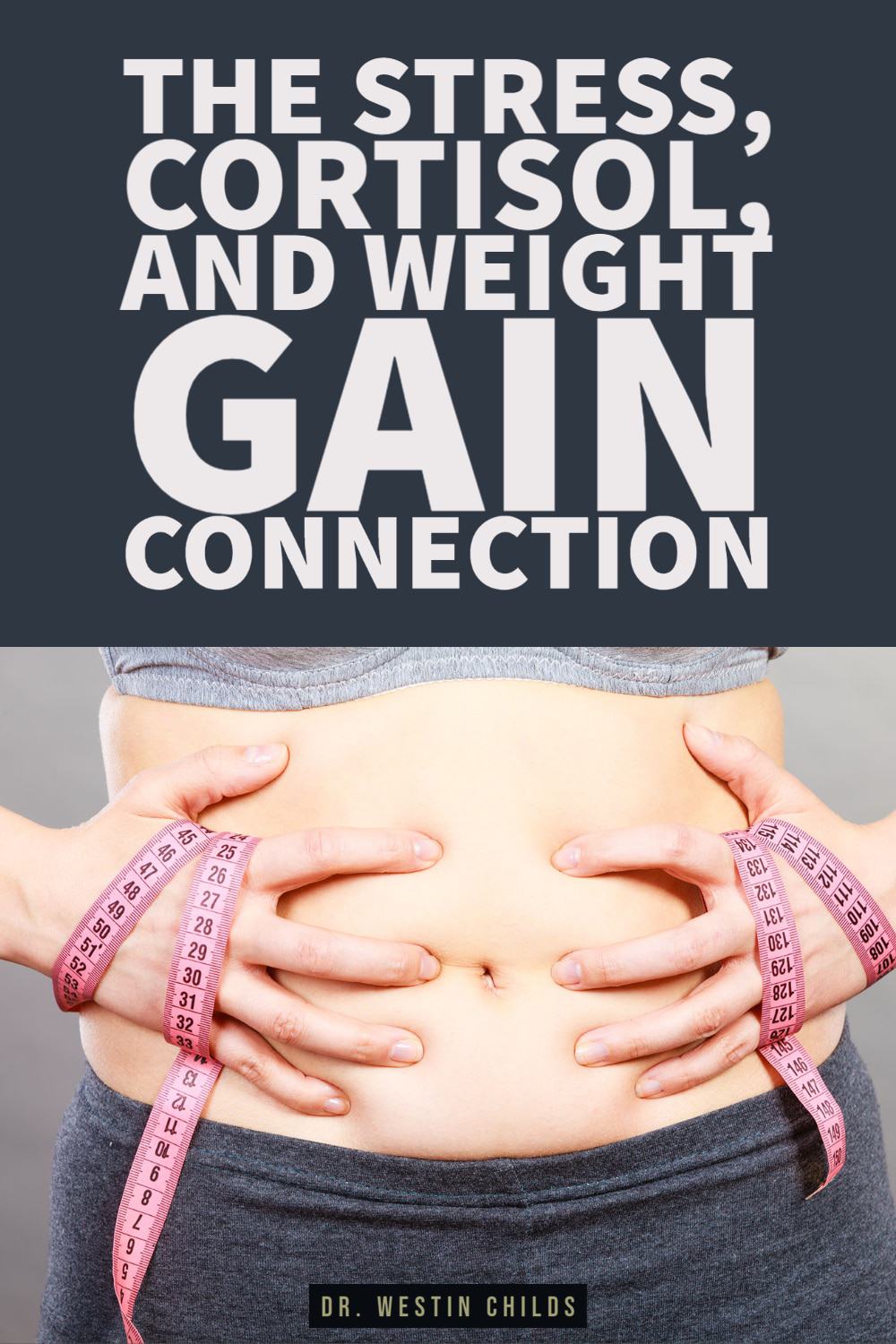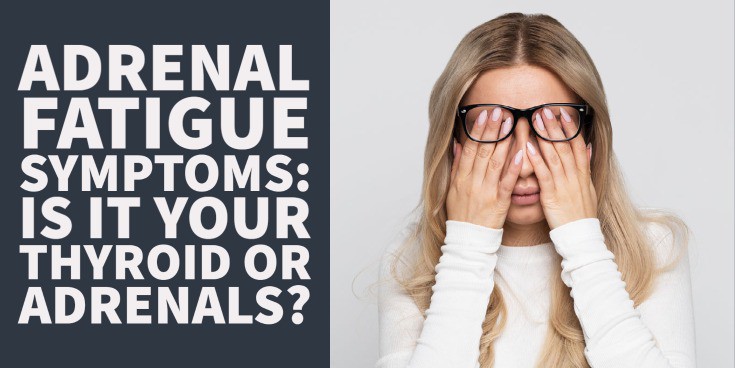Can too much stress increase cortisol and lead to weight gain?
The answer is a definite yes.
Stress influences multiple systems in the body and may lead to the dysregulation of one of the most important hormones in your body – cortisol.
Learn more about the influence stress has on cortisol and other hormones in your body and how to manage cortisol to help with weight loss…
How Stress Causes High Cortisol and Weight Gain
There’s this idea that all weight gain must come from overeating or under-exercising.
While food is certainly an important part of the weight gain puzzle, it’s not front and center for most people.
In fact, with few exceptions, most people are overweight because they have one or more serious hormone imbalances in their bodies (1).
These “fat impacting” hormones regulate energy production, fat tissue growth (2), and even modulate your appetite (3).
One such hormone is cortisol.

Cortisol is the major stress hormone in the body and it is primarily secreted in large amounts during times of stress (4).
The release of cortisol triggers changes in the way that your body metabolizes glucose, how much energy your muscles burn, and your tolerance to stress.
This is a good thing and we want it to happen.
The problem with stress (and cortisol) only comes when your system gets turned “on” too frequently and doesn’t have time to adequately recover.
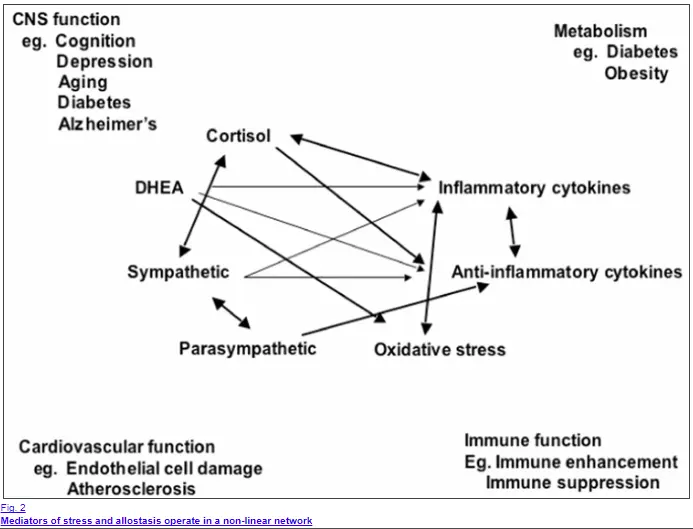
This constant stress results in the pathology of the endocrine and cortisol system otherwise known as the hypothalamic-pituitary axis (or HPA axis) (5).
Over time the constant release of cortisol turns from being a good thing to being pathologic to the body.
The constant release of cortisol may increase your risk of developing insulin resistance, raise your blood sugar, alter your appetite, reduce your ability to burn fat, and increases the rate at which you store fat.
In most people, this results in a spectrum of symptoms along with characteristic weight gain in the abdomen or belly (6).
Put in simple terms the pattern looks like this:
High stress = high cortisol = high insulin = elevated blood sugar = weight gain in the belly
You’ll notice that the inciting event is “stress” and this can be stress from basically any cause!
So how does stress lead to these pathologic changes?
We can use patients who suffer from chronic fatigue syndrome as a prototype.
These patients tend to experience 4 very specific changes to the HPA axis…
First:
There may be changes to serum cortisol levels (7) – these changes tend to be mild and difficult to spot but usually result in a slight reduction (examples of specific serum levels will follow).
Second:
There may be attenuation of the “normal” diurnal variation to cortisol throughout the day.
Normally cortisol peaks in the early morning and reduces in value throughout the day.
People with chronic fatigue may experience changes to this system.

Third:
There is an enhanced negative feedback loop associated with further stress to the body.
In essence, there is some point where stress results in positive changes to the body, but with over-stimulation of this system may “tip” the scale in favor of negative changes or pathology.
Once you “tip” to the negative side, stress is no longer beneficial to the body – at this point further stress causes worsening symptoms and more damage to the HPA axis.
Fourth:
There is a “blunted” response to the HPA axis.
You can consider this as a “tolerance” mechanism put in place by your body.
It’s a protective mechanism that may be present to prevent the onslaught of damage that occurs with further stress.
When we evaluate HPA dysregulation it’s important to realize that these changes all occur on a spectrum.

What this means for you is that damage builds up over time.
The more stress you are under and the longer you are under it will determine the severity of your symptoms.
All 4 of these changes are seen in those patients who suffer from chronic fatigue syndrome (CFS) but they may be occurring to some degree in your body (perhaps just not as bad).
And what’s important is that we KNOW that these changes do indeed happen.
Alternative medicine practitioners like to throw around the diagnosis of “adrenal fatigue” while many conventional physicians simply refuse to believe that any such condition exists.
The reality is somewhere in between.
We certainly know that chronic stress leads to undesirable changes, but these changes don’t always follow the traditional “adrenal fatigue” pattern that most people discuss.
Instead of obvious changes to serum cortisol levels in the body, there are most likely changes to cortisol receptor sensitivity (8) which results in many of the characteristic symptoms of adrenal-related problems that many people face.
DOWNLOAD FREE RESOURCES
Foods to Avoid if you Have Thyroid Problems:
I’ve found that these 10 foods cause the most problems for thyroid patients. Learn which foods you should avoid if you have thyroid disease of any type.
The Complete List of Thyroid Lab tests:
The list includes optimal ranges, normal ranges, and the complete list of tests you need to diagnose and manage thyroid disease correctly!
Symptoms of Excess Cortisol & Cortisol Dysregulation
The symptoms of excess cortisol vary widely among people but there are several “key” symptoms (9) that most people tend to express.
These symptoms include:
- Fatigue or low energy
- Weight gain especially in the belly area
- Reliance on caffeine and carbohydrates as energy sources
- The characteristic crash around 2-3 pm each day
- Characteristic “second wind” in the evening (usually around 9-10 pm)
- Difficulty getting up in the morning or increased fatigue first thing in the morning
- Strong cravings for sugary carbohydrates
- Difficulty sleeping at night, constant waking up in the middle of the night, difficulty falling asleep
- Decreased tolerance to stressful situations
- Changes to mood to include increased symptoms of depression or anxiety
- Racing mind or thoughts (inability to control your thoughts)
- The feeling of “burnout” (10) or not enjoying your work or social life
This list of symptoms is quite non-specific but it may help you to nail down the diagnosis.
Many of these symptoms may be caused by other problems including hormone imbalances, lack of sleep, etc.
The important part to understand is if you are experiencing these symptoms that you then move on to the next step which is evaluating or testing your serum cortisol level.
How to Test your Cortisol Level
Can we reliably test for cortisol problems?
Not all the time.
Serum cortisol only tells the story about what is happening in the bloodstream, it doesn’t necessarily give us information about what is happening at the cellular level.
But it’s still the best that we have, so it’s worth discussing.
You can test your serum cortisol with a simple blood test.
To get the best results you will want to check your cortisol at 8 am in the morning (11) (it’s a good idea to check other hormones at this time as well including thyroid function and sex hormones).
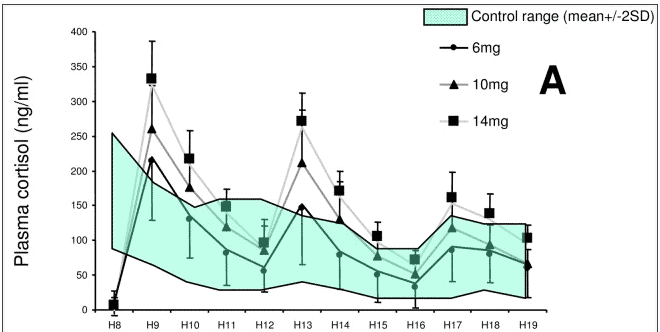
8 am is when your serum cortisol should be at its highest or at its “peak”.
Basically what happens is your body produces a large amount of cortisol which helps get you through the day.
In those people who suffer from chronic fatigue syndrome, morning serum cortisol may be slightly on the low side.
While in other individuals the serum cortisol may be slightly on the higher side.
When assessing serum cortisol levels you want to look for an “optimal” range.
In my experience, the optimal 8 am cortisol range is somewhere around 14-16 mcg/dL.
Elevated levels tend to be higher (greater than 20 mcg/dL), while lower levels (hypocortisolism) tend to be less than 10 mcg/dL.
To illustrate these ranges I’ve provided real examples below:

This serum cortisol is flagged as “high” with an absolute value of 30.5 mcg/dL and you can see the reference range is from 4.0 – 22.0 mcg/dL.

As another less obvious example, you can see this patient who has a serum cortisol level of 20.7 mcg/dL which puts her technically in the “normal” range but at the very high end of that range.

Lastly, you can see sub-optimal cortisol in the “low” range at 9.7 mcg/dL.
What’s interesting is that all of these patients presented with similar symptoms but have vastly different 8 am cortisol levels.
These aren’t hard and fast rules, but they may be helpful if you are struggling to find a diagnosis and treat your symptoms.
Another important factor worth discussing is that serum cortisol doesn’t necessarily correlate with the disease state.
Meaning you can have a relatively normal cortisol level but still have cortisol receptor resistance and therefore experience adrenal/cortisol-related weight gain and other symptoms.
One final point is that you may need to ask your physician to order your cortisol level and then interpret your lab result on your own.
Conventional physicians tend to only recognize 2 extreme cortisol-related states: Addison’s disease and Cushing’s Syndrome, they really don’t recognize issues between these two disease states.
The bottom line?
Even with normal serum cortisol, it is worth exploring treatment options.
How to Stop Weight Gain from Cortisol
If you have symptoms related to cortisol dysregulation and you have abnormal serum cortisol then it may be time to explore treatment options.
I’ve included below a list of several therapies designed to help reduce the impact that cortisol has on your body and “reset” the system so to speak.
Some of these therapies are common sense and others may be counter-intuitive at first but I can tell you from experience that they work.
#1. Reduce or Eliminate the Source of Stress
The first and most important step is to remove the source of your stress.
This isn’t always possible, I get that, but it should still be the thing that you focus on if possible.
Your symptoms will not resolve completely until the source has been removed.
If you can’t remove the source then the next best step is to increase your tolerance to stress in general.
You can do this using several therapies (many we discuss below) including things like ensuring that you sleep at least 8 hours each night, taking adrenal supplements, eating healthy sources of carbohydrates, and practicing meditation or mindfulness (12).
A word of warning:
Don’t neglect this step.
Many people will do basically everything but address the source of their stress and taking this route will not lead to long-term success.
Potential sources of stress include:
- Physical stress – too much exercise, lack of sleep, increased demand from your job, acting as a caretaker, etc.
- Social stress – Pressure from peers, tension in relationships (spouse or children), difficulty with relationships at work, etc.
- Emotional stress – From an emotionally demanding job (therapist, educator, physician, health professional, etc.), emotional abuse from close relationships, history of PTSD or other emotional trauma, divorce, etc.
- Environmental stress – Poor air quality, spending the majority of your day indoors (13), working in a stressful environment (lots of noise, bright lights, etc.), exposure to chemicals, etc.
- Health-related stress – chronic medical conditions (high blood pressure, metabolic disease, high cholesterol, etc.), hormone imbalances, nutrient deficiencies, history of depression/anxiety, etc.
Something as simple as taking a walk in nature, enjoying some time in the sun, and spending time relaxing or enjoying your family can dramatically improve your resilience to stress.
#2. Don’t Over-Exercise
This part can be confusing for many people.
You’re taught that in order to lose weight you must exercise, exercise, exercise.
The problem with some forms of exercise is that they actually put increased demand on the body and increase cortisol secretion (14).
Studies show that cortisol increases as exertion and intensity increase (which makes sense).
You can read that as they are causing stress to the body.
Under normal healthy circumstances, this is a good thing.
Your muscles recognize the stress, they break down slightly and then they repair but this time stronger and more capable to tolerate the stress.
The problem with excessive exercise is that you may never allow your body to heal from the last time you exercised.
This leads to over-exercising, chronic exhaustion, and even weight gain – even if you are exercising daily!
Many patients that I treat are always concerned when I tell them to reduce the amount they are exercising but they are all pleasantly surprised when they paradoxically start losing weight once they do.
Figuring out the amount that you need to exercise depends on your body, the amount of stress you are under, what medical conditions you have, etc.
The goal of exercising is to make sure that you are left energized afterward.
If you feel that you are overexercising you may find more luck switching to more low-intensity and adaptive exercise routines that include yoga or pilates.
Low-intensity exercise, at around 40% of VO2 max (15), does not seem to impact cortisol secretion significantly.
Contrary to popular belief you can actually lose weight doing these types of exercises!
#3. Avoid Caloric Restriction
Caloric restriction, much like over-exercising, puts increased stress on the body.
When you are overweight or gaining weight it’s very tempting to cut your calories and exercise, but this is exactly the wrong thing to do.
Prolonged caloric restriction, defined as more than 21 days, puts extra strain on your body, causes metabolic damage, increases cortisol (16), and causes changes to thyroid function (further reducing your metabolism).
When treating adrenal and cortisol-related problems it’s actually very important to consume sufficient calories to provide your body with energy.
Your goal should be to provide your body with real whole foods which provide your body with the building blocks for energy production.
Altering your diet may also impact other fat-storing hormones such as insulin and therefore help with weight loss.
Reducing your calories may be tempting, but fight the temptation because it will do more harm than good over the long term.
#4. Use Adrenal Support Supplements
Adrenal supplements have the potential to dramatically improve your results if taken correctly and for a sufficient amount of time.
I’m specifically talking about adrenal adaptogens and adrenal glandulars.
These supplements have many studies showing that they can alter cortisol (17), but that they can also promote weight loss by increasing muscle mass and by reducing recovery time post-workout.
When I was suffering from burnout and adrenal fatigue (from residency and medical school), I used adrenal supplements and credited much of my improvement to these herbs and botanicals.
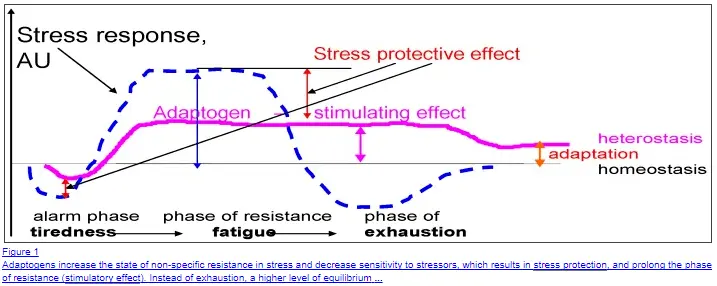
The reason for using supplements in conjunction with other therapies is quite simple:
If you are experiencing weight gain related to your stress then you can bet you most likely have other hormone imbalances.
This means that getting aggressive with treatment may be beneficial and may improve your results.
Supplementing with high-quality adrenal supplements such as ashwagandha or Rhodiola may be the boost your body needs.
The trick to using adrenal support is that you need to use them long enough – usually around 6 months.
They also should be combined with other therapies.
Don’t just take the supplements and call it a day, this will not lead to an improvement in your weight or your cortisol level.
#5. Eat Enough Carbs
Healthy carbohydrates
The consumption of sufficient carbohydrates may be necessary for energy production in those suffering from adrenal and cortisol issues.
The tendency of most overweight patients is to avoid carbohydrates completely.
In reality, many patients with cortisol dysregulation actually need more carbohydrates (18) (at least initially).
The tricky part with the consumption of carbohydrates is that the amount each person needs is highly variable.
As a general rule:
Those people who are more active tend to require more carbohydrates than those who are not.
This includes those people who are under a tremendous amount of stress – regardless of the cause.
Overexercising, chronic social stress, high demand at work, etc. all increase the demand on your body and therefore may increase the demand for carbohydrates.
It’s also true that some people simply function better with more carbohydrates than others.
There isn’t a catch-all diet that will work for every person because each of us is quite unique.
#6. Avoid Caffeine and Stimulants
Caffeine and other stimulants really are a double-edged sword.
On one hand, they can provide you with immediate energy, or at least an immediate sense of perceived energy.
On the other hand, it comes at a cost.
Supplements that “boost” energy, including caffeine, are well known to cause this effect which leads to overuse.
Caffeine puts increased demand on cellular function by increasing certain neurotransmitters (in addition to cortisol secretion (19)), especially norepinephrine (20).
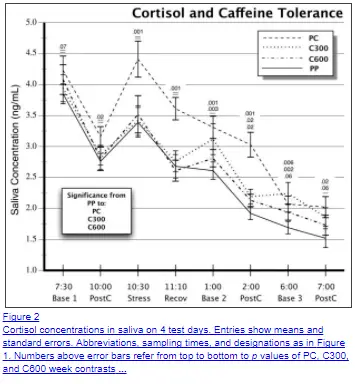
Norepinephrine is also manipulated when using prescription stimulants such as phentermine and ADD/ADHD medications (these are commonly used as appetite suppressants and for weight loss).
The increase of norepinephrine at the nerve synapse is felt to cause changes that result in increased focus, increased metabolism, and decreased fatigue – at least initially.
In addition, caffeine use also has been shown to stimulate cortisol release directly.
This may represent the increased demand put on the body (stress) or it may be an adaptive response – the studies aren’t clear.
Doses of 300mg or more per day have been shown to at least partially attenuate the increase in cortisol which may indicate tolerance to caffeine.
This means that larger and larger doses of caffeine may be necessary to provide the same benefit.
What’s even more interesting is that certain people tend to be more “sensitive” to caffeine.
These people react with an increase in blood pressure and an increase in cortisol (21) (more than other people) with consumption.
Because caffeine (and other stimulants) tend to be associated with weight loss, it may be counter-intuitive to stop them if you are having weight gain related to excessive cortisol but it may be necessary.
If you are suffering from weight gain related to cortisol and you find that you can’t get by without coffee, energy drinks, caffeine, etc. you may need to cut the habit to make a difference.
#7. Allow Enough Time!
Treating cortisol and adrenal-related problems takes time, a lot of it.
Most patients will need 6+ months of the treatments listed above for complete resolution.
You should, however, notice some improvement in your symptoms almost immediately upon practicing these therapies.
But it may take 6-12 months for you to get back to your old self.
It’s also important that you maintain these practices once you start feeling back to normal.
You will most likely notice that once you start feeling better you’ll start to push your body more and more and you may slip back over the “edge” and begin to experience the symptoms of burnout or adrenal fatigue.
Prevent this from happening by continuing these therapies indefinitely.
Final Thoughts
Cortisol is a potent stimulator of physiologic changes in your body which help your body “adapt” to stress.
Constant stimulation of this system may lead to pathology long term which may manifest in various symptoms including weight gain.
Fighting weight gain related to stress and cortisol release is as simple as managing your stress and practicing healthy lifestyle habits which increase your resilience to stress.
Be prepared to use these strategies long-term for the best results!
Now I want to hear from you:
Do you think stress is contributing to your weight?
Have you checked your cortisol level? If so, how did you test for it?
Have you tried adrenal adaptogens or other botanicals to improve your stress resiliency?
Have you tried other stress reduction techniques like meditation? Why or why not?
Leave your comments or questions below!
